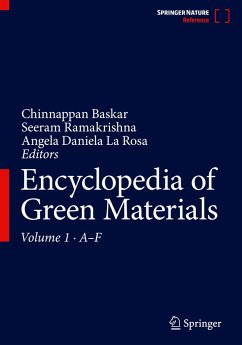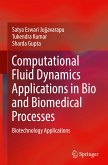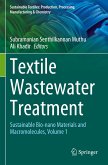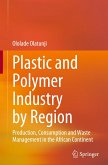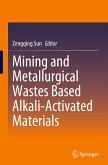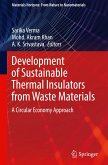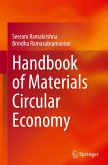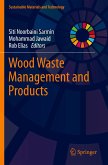Encyclopedia of Green Materials
Herausgegeben:Baskar, Chinnappan; Ramakrishna, Seeram; Daniela La Rosa, Angela
Encyclopedia of Green Materials
Herausgegeben:Baskar, Chinnappan; Ramakrishna, Seeram; Daniela La Rosa, Angela
- Gebundenes Buch
- Merkliste
- Auf die Merkliste
- Bewerten Bewerten
- Teilen
- Produkt teilen
- Produkterinnerung
- Produkterinnerung
Encyclopedia of Green Materials covers comprehensive overview, recent research and development of Green Materials and Green Nanomaterials, and their applications in all areas, including electronics, sensors, textiles, biomedical, energy and energy storage, building constructions and interiors design, automotive, green plastic manufacturing, food packing, membrane technology, wastewater treatment, rubber technology, and tire manufacturing. The contents focus on sustainable development, renewable, circular economy, Chemistry 4.0: Chemistry through innovation in transforming the world, green chemistry and green engineering, upcycling, and recycling. …mehr
Andere Kunden interessierten sich auch für
![Computational Fluid Dynamics Applications in Bio and Biomedical Processes Computational Fluid Dynamics Applications in Bio and Biomedical Processes]() Satya Eswari JujjavarapuComputational Fluid Dynamics Applications in Bio and Biomedical Processes113,99 €
Satya Eswari JujjavarapuComputational Fluid Dynamics Applications in Bio and Biomedical Processes113,99 €![Textile Wastewater Treatment Textile Wastewater Treatment]() Textile Wastewater Treatment81,99 €
Textile Wastewater Treatment81,99 €![Plastic and Polymer Industry by Region Plastic and Polymer Industry by Region]() Ololade OlatunjiPlastic and Polymer Industry by Region41,99 €
Ololade OlatunjiPlastic and Polymer Industry by Region41,99 €![Mining and Metallurgical Wastes Based Alkali-Activated Materials Mining and Metallurgical Wastes Based Alkali-Activated Materials]() Mining and Metallurgical Wastes Based Alkali-Activated Materials145,99 €
Mining and Metallurgical Wastes Based Alkali-Activated Materials145,99 €![Development of Sustainable Thermal Insulators from Waste Materials Development of Sustainable Thermal Insulators from Waste Materials]() Development of Sustainable Thermal Insulators from Waste Materials121,99 €
Development of Sustainable Thermal Insulators from Waste Materials121,99 €![Handbook of Materials Circular Economy Handbook of Materials Circular Economy]() Seeram RamakrishnaHandbook of Materials Circular Economy129,99 €
Seeram RamakrishnaHandbook of Materials Circular Economy129,99 €![Wood Waste Management and Products Wood Waste Management and Products]() Wood Waste Management and Products137,99 €
Wood Waste Management and Products137,99 €-
-
-
Encyclopedia of Green Materials covers comprehensive overview, recent research and development of Green Materials and Green Nanomaterials, and their applications in all areas, including electronics, sensors, textiles, biomedical, energy and energy storage, building constructions and interiors design, automotive, green plastic manufacturing, food packing, membrane technology, wastewater treatment, rubber technology, and tire manufacturing. The contents focus on sustainable development, renewable, circular economy, Chemistry 4.0: Chemistry through innovation in transforming the world, green chemistry and green engineering, upcycling, and recycling.
Hinweis: Dieser Artikel kann nur an eine deutsche Lieferadresse ausgeliefert werden.
Hinweis: Dieser Artikel kann nur an eine deutsche Lieferadresse ausgeliefert werden.
Produktdetails
- Produktdetails
- Verlag: Springer / Springer Nature Singapore / Springer, Berlin
- Artikelnr. des Verlages: 978-981-97-4617-0
- Seitenzahl: 2100
- Erscheinungstermin: 10. Dezember 2024
- Englisch
- Abmessung: 260mm x 183mm x 121mm
- Gewicht: 4942g
- ISBN-13: 9789819746170
- ISBN-10: 9819746175
- Artikelnr.: 70767897
- Herstellerkennzeichnung Die Herstellerinformationen sind derzeit nicht verfügbar.
- Verlag: Springer / Springer Nature Singapore / Springer, Berlin
- Artikelnr. des Verlages: 978-981-97-4617-0
- Seitenzahl: 2100
- Erscheinungstermin: 10. Dezember 2024
- Englisch
- Abmessung: 260mm x 183mm x 121mm
- Gewicht: 4942g
- ISBN-13: 9789819746170
- ISBN-10: 9819746175
- Artikelnr.: 70767897
- Herstellerkennzeichnung Die Herstellerinformationen sind derzeit nicht verfügbar.
Chinnappan Baskar is Associate Professor and Head in the Department of Chemistry, School of Physical and Chemical Sciences, Central University of Kashmir, Ganderbal, Jammu and Kashmir, India, and Visiting Professor in the Department of Chemistry and Department of Physics, Pattimura University, Ambon, Indonesia. He received M. Sc Chemistry from Indian Institute of Technology (IIT) Madras and PhD in Organic and Materials Chemistry from National University of Singapore (NUS), Singapore. He has worked as Director, Himalayiya University (now Sparsh Himalaya University), Dehradun; Director, Research and Development Center, Teerthanker Mahaveer University, Moradabad; Director (Officiating); THDC Institute of Hydropower Engineering and Technology Tehri, Uttarakhand Technical University, Dehradun, India; Brain Korean 21 (BK21) Research Professor, Department of Environmental Engineering and Biotechnology, and Co-researcher in Energy and Environmental Fusion Technology Center, Myongji University, South Korea. His research interests include Synthetic Organic Chemistry, Conducting Polymers, Green Chemistry and Engineering, Ionic Liquids, Biomass Conversion; Biodegradable Polymers, Green Materials, Circular Economy, Solid Waste Management and Sustainable Development Goals. He has published several research papers in reputed international journals with high impact factors and citations. He was Editor-in-Chief, Handbook Solid Waste Management, Springer Nature (2022), Singapore and Editor of Biomass Conversion: The Interface of Biotechnology, Chemistry and Materials Science (Springer-Verlag, 2012); Editor-in-Chief, Analytical Chemistry Letters, a journal of Taylor & Francis Groups, United Kingdom (2020-2021). Dr. Baskar is Author and President of YSB Foundation, Public Charitable Trust, Dehradun, Uttarakhand, India. Seeram Ramakrishna, FREng, is Director of Center for Nanofibers and Nanotechnology at the Department of Mechanical Engineering, National University of Singapore (NUS). He chairs the Circular Economy Taskforce, and a member of Enterprise Singapore's ISO/TC323 committee on Circular Economy. He has co-authored over 1,000 SCI listed international journal papers. He received his Ph.D. from University of Cambridge, UK. He received numerous recognitions which include CUT Honorary Engineering Doctorate, ASEAN Outstanding Engineer Award; UK Cambridge Nehru Fellowship, Singapore LKY Fellowship, and more. He facilitated large scale research and innovation partnerships with world leading universities in USA, Europe, and Asia. Angela Daniela La Rosa is Associate Professor of the Department of Manufacturing and Civil Engineering at the Norwegian University of Science and Technology (NTNU). She is a chemist with a strong focus on polymer composites and environmental impact including LCA/LCC. She holds a Ph.D. in Chemistry of Polymer Materials, carried out in the Wilton International Research Centre (UK), within the Strategic Technology Group of ICI (Imperial Chemical Industries). Prof. La Rosa started her education on LCA and LCC in 2006 through a research visit at the Division of Environmental Systems, Chalmers University of Technology, Gothenburg, and by attending an advanced course in Life Cycle Assessment at the Royal Institute of Technology (KTH) Stockholm, Sweden. Since then, she has published several articles on LCA applied on polymer composites. Currently she teaches a course on LCA of energy systems and a course on LCA for Ecodesign at NTNU, Norway.
Agro-Industrial Residues and Plant Biomass as Green Corrosion Inhibitors.- Biopolymers for Stabilizing Granular Soil.- Environmental Benign Green Materials, Synthesis and Applications.- Green Inhibitors for Corrosion Inhibition of Metals.- Natural Extracts as Bath Additive in the Zinc Electroplating Process.- Natural Resources-Based Activated Carbon Synthesis.- Plant-Derived Green Materials for Pharmaceutical Applications.- TEOS/GPTMS Silane Sol-Gel Hybrid Film for Corrosion Protection of Carbon Steel.- Value-Addition to Paper Waste.- Biosynthesis of Nanomaterials and Applications in Biomedical Industry.- Essential Oil-Mediated Synthesis of Metal and Metal Oxide Nanoparticles.- Fabrication and Application of Starch Nanoparticles.- Green Nanomaterials and Their Applications.- Green Nanomaterials Synthesis from Third-Generation Algae.- Green Plasmonic Nanoparticles.- Green Quantum Dots for Solar Cell Application.
Agro-Industrial Residues and Plant Biomass as Green Corrosion Inhibitors.- Biopolymers for Stabilizing Granular Soil.- Environmental Benign Green Materials, Synthesis and Applications.- Green Inhibitors for Corrosion Inhibition of Metals.- Natural Extracts as Bath Additive in the Zinc Electroplating Process.- Natural Resources-Based Activated Carbon Synthesis.- Plant-Derived Green Materials for Pharmaceutical Applications.- TEOS/GPTMS Silane Sol-Gel Hybrid Film for Corrosion Protection of Carbon Steel.- Value-Addition to Paper Waste.- Biosynthesis of Nanomaterials and Applications in Biomedical Industry.- Essential Oil-Mediated Synthesis of Metal and Metal Oxide Nanoparticles.- Fabrication and Application of Starch Nanoparticles.- Green Nanomaterials and Their Applications.- Green Nanomaterials Synthesis from Third-Generation Algae.- Green Plasmonic Nanoparticles.- Green Quantum Dots for Solar Cell Application.

